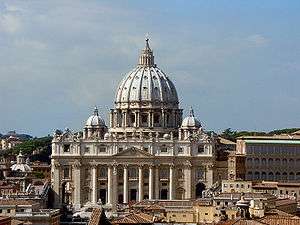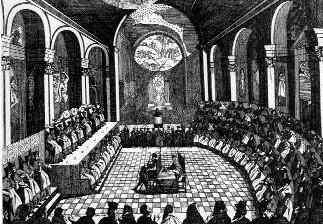Unitatis redintegratio
| Second Vatican Ecumenical Council Concilium Oecumenicum Vaticanum Secundum (Latin) | |
|---|---|
 Saint Peter's Basilica Venue of the Second Vatican Council | |
| Date | 11 October 1962 – 8 December 1965 |
| Accepted by | Catholic Church |
Previous council | First Vatican Council |
| Convoked by | Pope John XXIII |
| President |
Pope John XXIII Pope Paul VI |
| Attendance | up to 2,625 |
| Topics | The Church in itself, its sole salvific role as the one, true and complete Christian faith, also in relation to ecumenism among other religions, in relation to the modern world, renewal of consecrated life, liturgical disciplines, etc. |
Documents and statements |
Four Constitutions:
Three Declarations:
Nine Decrees:
|
| Chronological list of ecumenical councils | |
| Part of a series on |
| Ecumenical councils of the Catholic Church |
|---|
 Renaissance depiction of the Council of Trent |
| Antiquity (c. 50 – 451) |
| Early Middle Ages (553–870) |
| High and Late Middle Ages (1122–1517) |
| Modernity (1545–1965) |
|
|
Unitatis redintegratio (Latin for "Restoration of unity") is the Second Vatican Council's decree on ecumenism. It was passed by a vote of 2,137 to 11 of the bishops assembled, and was promulgated by Pope Paul VI on 21 November 1964. Its title is taken from the opening words of the Latin text. The opening of the document's English translation is: "The restoration of unity among all Christians is one of the principal concerns of the Second Vatican Council."
Description
Unitatis Redintegratio calls for the reunion of Christendom and is similar to previous calls for unity by Pope Leo XIII in the 1894 encyclical Praeclara gratulationis publicae. However, Unitatis articulates a different kind of ecclesiology than Praeclara. It focuses on the unity of the people of God and on separate Christian brethren rather than insisting according to the classical formulation that schismatics must return to the fold under the unity of the Vicar of Christ.
Unitatis acknowledges that there are serious problems facing prospects of reunion with Reformation communities that make no attempt to claim apostolic succession as the Anglican communion does. Ecclesial communities that adhere to Calvinism are a particularly challenging case because they and Catholicism have important doctrinal differences on key issues such as ecclesiology, liturgy and mariology. Other communities have insoluble doctrinal differences with Catholic Christianity because their theology of the Holy Trinity is manifestly incompatible with the doctrine as articulated by the council of Nicea in the early Church.
Cardinal Walter Kasper discussed the status of these problems on the 40th anniversary of the promulgation of Umitatis in remarks titled "The Decree on Ecumenism – Read Anew After Forty Years".[1]
Contents
The numbers given correspond to the section numbers within the text.
- Introduction (1)
- I. Catholic Principles on Ecumenism (2-4)
- II. The Practice of Ecumenism (5-12)
When considering how the Church may allow for "common worship", which must never be used "indiscriminately", it is for "local episcopal authority, unless otherwise provided for by the Bishops' Conference according to its statutes, or by the Holy See" to determine the course to follow, making due provision for specific "circumstances of time, place, and persons". (8)[lower-alpha 1]
- III. Churches and Ecclesial Communities Separated from the Roman Apostolic See (13-24)
- III 1. The Special Consideration of the Eastern Churches (14-18)
- III 2. Separated Churches and Ecclesial Communities in the West (19-24)
See also
- Separated brethren
- Ut unum sint, John Paul II, 25 May 1995
Notes
References
- ↑ Kasper, Walter (11 November 2004). "The Decree on Ecumenism, Read Anew After Forty Years". Pontifical Council for Promoting Christian Unity. Retrieved 13 May 2018.
- ↑ Tornielli, Andrea (13 May 2018). "'Il Concilio e due encicliche ammettono casi di eucaristia ai protestanti'". La Stampa (in Italian). Retrieved 13 May 2018.
External links
